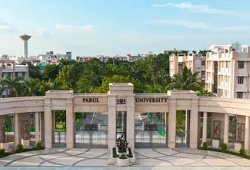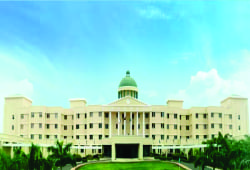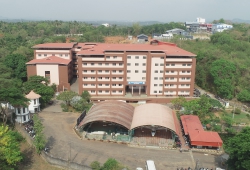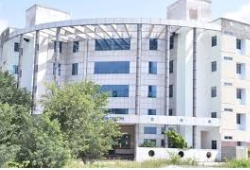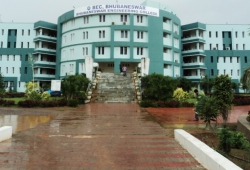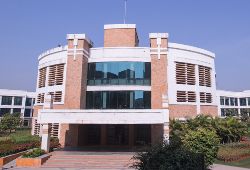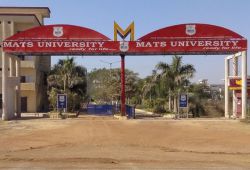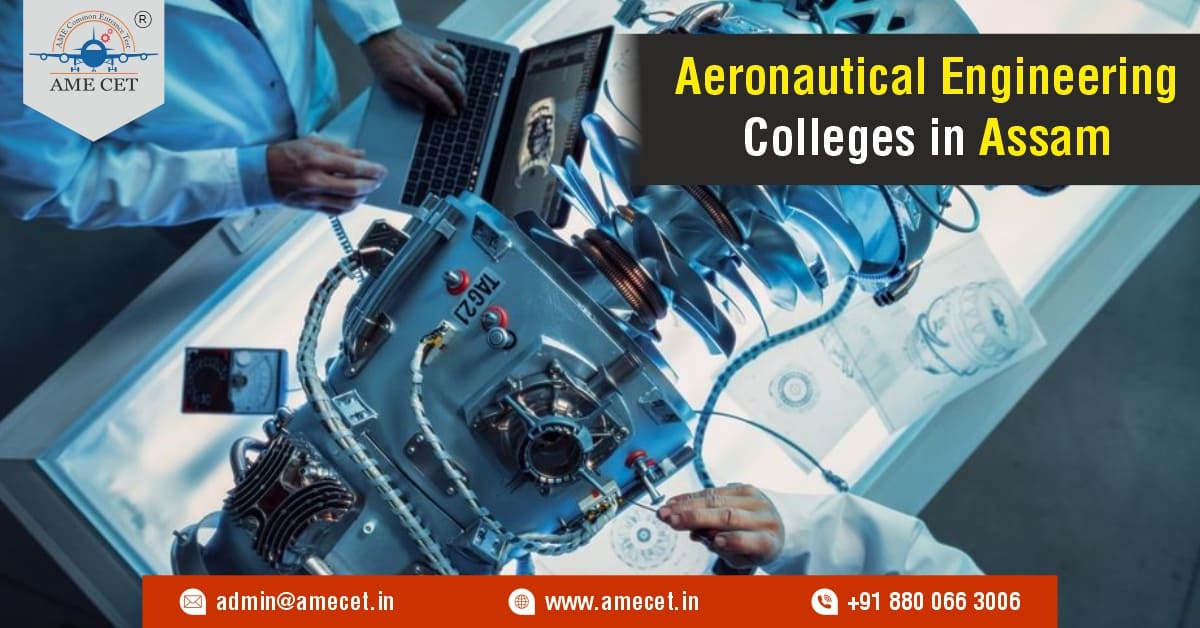
Aeronautical Engineering Colleges in Assam
Assam, known for its lush greenery and diverse topography, is emerging as a hub for aeronautical engineering education in Northeast India. The state’s strategic location near international borders makes it an important center for aviation and defense-related research. Aeronautical engineering colleges in Assam offer modern infrastructure, well-equipped laboratories, and industry collaborations that help students gain hands-on experience in aircraft design, maintenance, and avionics. Geographically, Assam’s moderate climate supports aerospace testing and research. Culturally, the state boasts a rich heritage, with vibrant festivals like Bihu and a harmonious blend of traditions that create an engaging student life. These factors make Assam an ideal destination for aspiring aeronautical engineers.
Aeronautical Engineering Course Fees in Assam
The cost of an aeronautical engineering course in Assam can vary based on several factors, including the institute, the duration of the program, and the type of degree offered. A bachelor's degree typically costs between INR 1,00,000 and INR 5,00,000, while a diploma or certification program costs between INR 50,000 and INR 2,00,000.
Let's examine Assam's aeronautical engineering course costs according to degree levels:
Diploma in Aeronautical Engineering
- Aeronautical engineering diploma programs are frequently more reasonably priced and provide a great foundation for those just starting out in the industry. Depending on the institution, these programs usually last one to two years and cost between INR 40,000 and INR 1,00,000.
Bachelor's Degree in Aeronautical Engineering
- A bachelor's degree is a common option for those seeking a thorough education in aeronautical engineering. Usually, the program lasts four years. Fees in Assam, especially at prestigious institutions, can range from INR 1,00,000 to INR 4,00,000 or more.
Master's Degree in Aeronautical Engineering
- People who want to specialize and progress in their careers frequently enroll in Master's programs in Aeronautical Engineering. Depending on the reputation of the institution, these programs can cost anywhere from INR 1,50,000 to INR 6,00,000 and usually last for two years.
Scholarships and Financial Aid
- As previously stated, financial aid and scholarships can play a significant role in lessening the financial load. For worthy students, a variety of public and private organizations in Assam provide grants and scholarships. By looking into and applying for these opportunities, you can lower the cost of your education.
Aeronautical Engineering Course Duration
The average college program in aeronautical engineering lasts four years, with eight semesters of thorough coursework. Students who complete these four years are prepared to become skilled aeronautical engineers with the knowledge and abilities to support the aerospace sector.
Eligibility Criteria for Aeronautical Engineering Colleges in Assam
You must fulfill specific eligibility requirements before you can start your aeronautical engineering career. Let's examine the requirement for prospective students studying aeronautical engineering:
-
Educational Foundation: Having a solid background in mathematics, physics, and chemistry and passing the 10+2 exam.
-
Entrance Examinations: Qualifying in entrance examinations like JEE Main, JEE Advanced, AME CET, or state-level engineering entrance tests.
-
Minimum Aggregate Marks: Attaining a qualifying exam score of at least 50%, typically or more.
-
Additional Entrance Exams: Candidates may be required to pass additional entrance exams administered by the individual colleges.
-
Age and Nationality Requirements: For eligibility, some colleges may have particular age restrictions or nationality requirements.
Aeronautical Engineering Campus Facilities in Assam
Modern infrastructure and facilities that support practical training and research are essential to the success of aeronautical engineering. Let's examine the cutting-edge resources offered by Assam's aeronautical colleges:
-
Cutting-Edge Laboratories: These labs give students a practical understanding of aviation technology by housing wind tunnels, material testing equipments, and flight simulation tools.
-
aircraft maintenance Hangars: Students can obtain hands-on experience in aircraft maintenance and repair in on-campus hangars, which is an essential skill in the aerospace sector.
-
Rich Library Resources: To meet academic and research needs, libraries are well-stocked with books, research papers, and internet resources.
-
Aviation Workshops: The tools and equipment required to construct and modify aircraft components are available in workshops.
-
Computer Labs: Specialized software for engineering projects and aerodynamic simulations is available in these labs.
-
Interactive Classrooms: Through the use of audio-visual aids, interactive learning is encouraged in modern classrooms, improving the educational process.
-
Research Centers: These facilities offer students the chance to work on innovative projects and are devoted to cutting-edge aerospace research.
-
Hostel Facilities: On-campus housing promotes a sense of community among aspiring engineers while also ensuring students' safety.
-
Sports and Recreation: Sports fields, cultural clubs, and gyms give students a well-rounded lifestyle that fosters overall development.
Aeronautical Engineering Colleges Admission Process in Assam
Securing a seat in a prestigious aeronautical engineering college in Assam involves a specific process. Here are the steps and requirements you need to follow:
-
Application: Start by completing the AME CET application form and entering the necessary information.
-
Entrance Exam: The AME CET exam, which assesses candidates' knowledge and proficiency in aircraft maintenance engineering, must be taken.
-
Counseling: Following the announcement of the exam results, qualified applicants are asked to attend counseling sessions where they can select the colleges and courses that best suit their needs based on their AME CET scores and available seats.
-
Document Verification: Candidates must provide the required paperwork, such as identification documents, AME CET scorecards, and educational certificates, during the counseling process.
-
Seat Allotment: Candidates are given seats by colleges according to their selections and performance on the AME CET exam.
-
Fee Payment: To guarantee their spot at the selected college, admitted students must pay the necessary fees.
-
Reporting to College: Lastly, in order to finish the admissions requirements and start their aeronautical engineering program, students who were accepted through AME CET must report to their respective colleges on the specified date.
Aeronautical Engineering Entrance Exam in India
The first step to an exciting career in aviation is passing the entrance exam for aeronautical engineering. These standardized tests assess prospective students' aptitude, knowledge, and skills. The following are significant entrance exams accepted for admission to Indian programs in aeronautical engineering:
-
Joint Entrance Examination (JEE) Main: Numerous esteemed engineering colleges, including those in Assam, take into account JEE Main scores for admissions. This national entrance exam evaluates applicants' knowledge of mathematics, physics, and chemistry.
-
Joint Entrance Examination (JEE) Advanced: After passing JEE Main, candidates move on to JEE Advanced, which is used to gain admission to esteemed Indian Institutes of Technology (IITs) that offer programs in aeronautical engineering.
-
Aircraft Maintenance Engineering Common Entrance Test (AME CET): Colleges in Assam and throughout India accept the AME CET, which is intended especially for admission to programs in aircraft maintenance engineering, a discipline closely related to aeronautical engineering.
-
State-Level Engineering Entrance Exams: Many states in India conduct their own engineering entrance exams, and students can use the scores from these exams to secure admission in aeronautical engineering programs within their respective states.
Download Brochure for Aeronautical Engineering Colleges in Assam
The correct information is the first step on your journey to the stars. To begin your thrilling aerospace career, download the brochure for Assam's Aeronautical Engineering Colleges.
Specializations in Aeronautical Engineering
To meet the varied needs of the aviation and aerospace industries, aeronautical engineering is a multidisciplinary field with a range of specializations. Assam's aeronautical engineering colleges provide a variety of specialized programs that let students focus their education on particular interests:
-
Aircraft Design and Manufacturing: Covers aerodynamics, structural design, materials, and manufacturing processes with an emphasis on building safe and effective aircraft.
-
Aerospace Propulsion: Teaches students about engine design and flight mechanics while focusing on aircraft engines, rockets, and propulsion systems.
-
Avionics and Control Systems: Examines the electronic systems found in aircrafts, such as flight control, navigation, and communication.
-
Aircraft Maintenance and Repair: Focuses on maintaining, inspecting, and repairing aircraft to guarantee their airworthiness and safety.
-
Space Technology and Exploration: Prepares students for projects involving satellites, space missions, and interplanetary exploration by delving into spacecraft design, satellite technology, and space mission planning.
-
Aeronautical Research and Development: Encourages students to work on projects that push the limits of aerospace technology and innovation by emphasizing cutting-edge research in the field..
-
Unmanned Aerial Vehicles (UAVs) and Drones: Focuses on the development, use, and operation of unmanned aerial vehicles for data collection, delivery, and surveillance.
-
Aerospace Management: Covering subjects like airline management, aviation marketing, and aviation operations, it is aimed at students who are interested in the business side of the aviation sector..
Higher Qualifications in Aeronautical Engineering
Professionals can pursue a wide range of opportunities in the dynamic and constantly changing field of aeronautical engineering by obtaining additional qualifications. Think about these choices:
-
Master's in Aeronautical Engineering (M. Tech/MS): Go deeper into the topic and focus on things like structural design, propulsion systems, or aerodynamics.
-
Doctor of Philosophy (Ph.D.) in Aeronautical Engineering: Make a contribution to the field by conducting research, which can lead to high-level roles in the aerospace industry, research, or academia.
-
Master of Business Administration (MBA): Make strategic decisions and oversee aerospace projects by combining technical expertise with business skills.
-
Certifications and Licenses: Enhance your skill set by pursuing certifications and licenses relevant to the aerospace industry.
-
Short-Term Courses and Workshops: Attend workshops and short-term courses tailored to your industry to stay up to date on the most recent developments.
-
Specialized Master's Programs: Examine specialized master's degrees in fields such as space technology, aviation safety, or aerospace management.
-
Online Courses and MOOCs: Take advantage of MOOCs and online courses to easily learn new skills and information.
Top Recruiters for Aeronautical Engineering Graduates
Your dream job in the aerospace industry is waiting, and top recruiters are eager to hire aeronautical engineering graduates. Here are some of the leading companies that actively seek aeronautical engineers:
-
Indian Space Research Organization (ISRO): Offers exciting career opportunities in satellite development, rocket propulsion, and space exploration projects.
-
Hindustan Aeronautics Limited (HAL): A major aerospace and defense company recruiting aeronautical engineers for roles in aircraft and helicopter manufacturing.
-
Defense Research and Development Organization (DRDO): Involves aeronautical engineers in defense technology projects, including missile development and avionics systems.
-
Bharat Heavy Electricals Limited (BHEL): Hires aeronautical engineers for work on gas turbine equipment used in power generation.
-
National Aeronautics Laboratory (NAL): Focuses on aerospace research, where aeronautical engineers contribute to aircraft design, wind tunnel testing, and aerodynamic research.
-
Air India: The national carrier employs aeronautical engineers for aircraft maintenance and engineering, ensuring flight safety.
-
Private Aerospace Companies: Companies like Tata Advanced Systems, L&T, and Mahindra Aerospace provide diverse career opportunities in aerospace technology and manufacturing.
-
Aviation Companies: airlines such as indigo, spicejet, and Vistara hire aeronautical engineers for aircraft maintenance and safety roles.
-
Research and Development Centers: Aeronautical engineering graduates can engage in cutting-edge research in educational institutions, research centers, and independent organizations.
-
Consulting and Engineering Firms: Consulting giants like Wipro, TCS, and Infosys have aerospace divisions that offer engineering solutions to the aviation and aerospace industry.
Aeronautical Engineering Course Syllabus
Understanding the syllabus is crucial for prospective students. Here's an overview of the typical curriculum and subjects covered in aeronautical engineering programs in India:
First Year Courses:
- Mathematics and Applied Mathematics:
- Calculus
- Linear Algebra
- Differential Equations
- Probability and Statistics
- Physics:
- Mechanics
- Electromagnetism
- Waves and Optics
- Engineering Mechanics:
- Statics and Dynamics
- Kinematics and Kinetics
- Equilibrium of Structures
- Engineering Graphics:
- Geometrical drawing
- Projections
- Sectional views
Second Year Courses:
- Aerodynamics:
- Fundamental principles
- Compressible and incompressible flows
- Boundary layers
- Fluid Mechanics:
- Fluid properties and behavior
- Fluid statics and dynamics
- Control volume analysis
- Materials Science and Engineering:
- Properties of materials
- Material selection for aerospace applications
- Heat treatment and material testing
- Thermodynamics:
- Basic concepts
- Laws of thermodynamics
- Gas dynamics
Third Year Courses:
- Aircraft Structures:
- Structural analysis
- Stress and strain analysis
- Finite element analysis
- Aircraft Propulsion:
- Gas turbine engines
- Jet propulsion
- Propeller theory
- Aircraft Design and Manufacturing:
- Design process
- Manufacturing techniques
- Composite materials in aircraft design
- Avionics and Control Systems:
- Avionics components and systems
- Aircraft control systems
- Flight control systems
Fourth Year Courses:
- Flight Mechanics and Aircraft Performance:
- Aircraft performance parameters
- Stability and control
- Flight testing
- Aircraft Maintenance and Repair:
- Maintenance practices
- Aircraft inspection and repair
- Regulatory compliance
- Aerospace Propulsion Systems:
- Advanced propulsion systems
- Rocket propulsion
- Hybrid propulsion
- Project Work and Internships:
- Final year project
- Industry internships
Pursuing aeronautical engineering in Assam offers students the advantage of quality education, industry exposure, and a unique cultural experience. With its growing aviation sector, strong academic foundations, and scenic environment, Assam provides a promising pathway for students aspiring to build successful careers in the aerospace industry.



